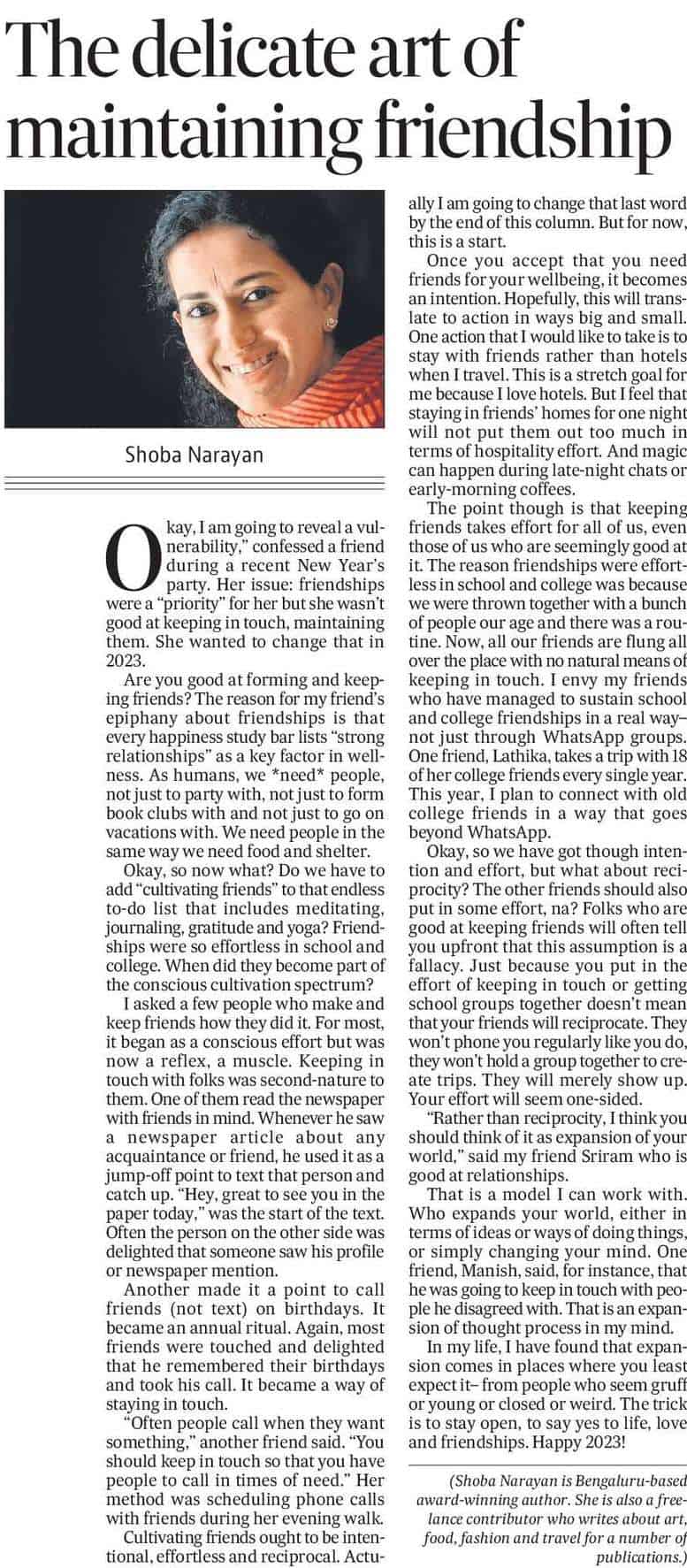
“Okay, I am going to reveal a vulnerability,” confessed a friend during a recent New Year’s party. Her issue: friendships were a “priority” for her but she wasn’t good at keeping in touch, maintaining them. She wanted to change that in 2023.
Are you good at forming and keeping friends? The reason for my friend’s epiphany about friendships is that every happiness study bar none lists “strong relationships” as a key factor in wellness. As humans, we *need* people, not just to party with, not just to form book clubs with and not just to go on vacations with. We need people in the same way we need food and shelter.
Okay, so now what? Do we have to add “cultivating friends” to that endless to-do list that includes meditating, journaling, gratitude and yoga? Friendships were so effortless in school and college. When did they become part of the conscious cultivation spectrum?

I asked a few people who make and keep friends how they did it. For most, it began as a conscious effort but was now a reflex, a muscle. Keeping in touch with folks was second-nature to them. One read the newspaper with friends in mind. Whenever he saw a newspaper article about any acquaintance or friend, he used it as a jump-off point to text that person and catch up. “Hey, great to see you in the paper today,” was the start of the text. Often the person on the other side was delighted that someone saw his profile or newspaper mention.
Another made it a point to call friends (not text) on birthdays. It became an annual ritual. Again, most friends were touched and delighted that he remembered their birthdays and took his call. It became a way of staying in touch.
“Often people call when they want something,” another friend said. “You should keep in touch so that you have people to call in times of need.” Her method was scheduling phone calls with friends during her evening walk.
Cultivating friends ought to be intentional, effortless and reciprocal. Actually I am going to change that last word by the end of this column. But for now, this is a start.
Once you accept that you need friends for your wellbeing, it becomes an intention. Hopefully, this will translate to action in ways big and small. One action that I would like to take is to stay with friends rather than hotels when I travel. This is a stretch goal for me because I love hotels. But I feel that staying in friends’ homes for one night will not put them out too much in terms of hospitality effort. And magic can happen during late-night chats or early-morning coffees.
The point through is that keeping friends takes effort for all of us, even those of us who are seemingly good at it. The reason friendships were effortless in school and college was because we were thrown together with a bunch of people our age and there was a routine. Now, all our friends are flung all over the place with no natural means of keeping in touch. I envy my friends who have managed to sustain school and college friendships in a real way– not just through Whatsapp groups. One friend, Lathika, takes a trip with 18 of her college friends every single year. This year, I plan to connect with old college friends in a way that goes beyond Whatsapp.
Okay, so we have got though intention and effort, by what about reciprocity? The other friends should also put in some effort, na? Folks who are good at keeping friends will often tell you upfront that this assumption is a fallacy. Just because you put in the effort of keeping in touch or getting school groups together doesn’t mean that your friends will reciprocate. They won’t phone you regularly like you do, they won’t hold a group together to create trips. They will merely show up. Your effort will seem one-sided.
“Rather than reciprocity, I think you should think of it as expansion of your world,” said my friend Sriram who is good at relationships.
That is a model I can work with. Who expands your world, either in terms of ideas or ways of doing things, or simply changing your mind. One friend, Manish, said, for instance, that he was going to keep in touch with people he disagreed with. That is an expansion of thought process in my mind.
In my life, I have found that expansion comes in places where you least expect it– from people who seem gruff or young or closed or weird.




Interesting read! Great flow!